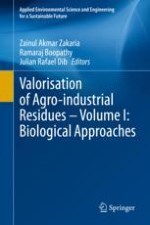2020 | OriginalPaper | Chapter
12. Cyanobacterial Degradation of Organophosphorus Pesticides
Authors : Nimisha Vijayan P, Sabu Abdulhameed
Published in: Valorisation of Agro-industrial Residues – Volume I: Biological Approaches
Publisher: Springer International Publishing
Activate our intelligent search to find suitable subject content or patents.
Select sections of text to find matching patents with Artificial Intelligence. powered by
Select sections of text to find additional relevant content using AI-assisted search. powered by
